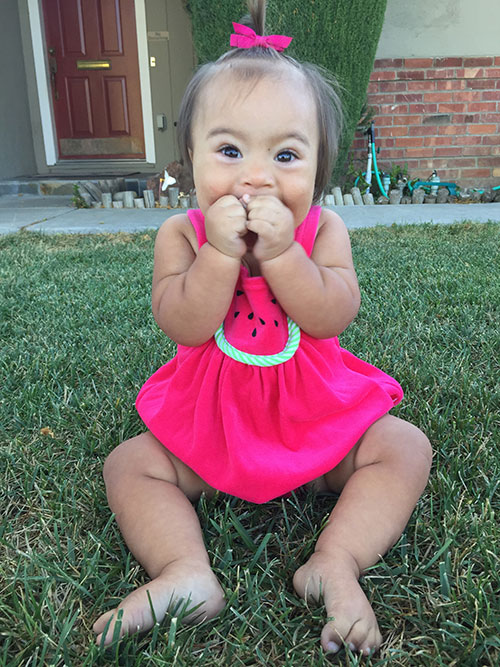
I always wanted three children. I never expected one of them to have Down syndrome. I was 11 weeks pregnant when we found out that Baby A had an extra chromosome. When I agreed to the pre-screening tests I was more excited about the ability to learn the sex of the baby with a simple blood test in the first trimester. I never expected anything but a normal result – the thought never even crossed my mind. I already had two beautiful, healthy children and was just adding one more to the batch.
So when I got the call just a few hours into my workday on February 11, 2014, I was shocked and sad. My eyes instantly teared up as the voice on the other end repeated at least three times, “there is a 99 percent chance your baby has down syndrome.”
My husband and I went in for “genetics counseling” the next day to learn more. I felt like I was being given statistics for all the bad things that “could” happen because the baby has Down Syndrome. I couldn’t help but wonder what the stats were for everything in our lives: Â the chances of getting cancer, the chances of having to wear glasses, the chances of getting hit by a car.
We don’t really ever think about those things, but this time they were front and center; being repeated like they were a certainty. I left in tears thinking that my unborn child’s life would be nothing but an uphill battle with little hope. I didn’t have a real sense of what her life would be like. No wonder 80-90 percent of people choose to terminate a pregnancy with just a medical view of the situation.
I wanted to know more. I needed to know more. What was life like with these challenges? Would she be in pain? Could she have a good life? How would this affect my other children? I turned to the Internet and read endless stories – positive and hopeful stories of people with Down Syndrome who own their own businesses, graduate from college, get married, and even live independently.
I learned about the many resources available from birth to ensure milestones are met. I learned about some of the promising research underway that could have a dramatic affect on her cognitive abilities. I suddenly felt encouraged and hopeful. She was going to have a good life! We decided to continue on life’s journey.
On August 13, 2014 Avery Madison Brill was born. We are fortunate that she wasn’t born with any additional health issues that Down syndrome babies are “more likely” to have. She is a healthy baby who is meeting all of her developmental milestones so far. I know there are still many unknowns ahead of us. But isn’t that life?
Our hope for Avery is that we can give her every chance to succeed in life – what every parent wants for their child. Improving the cognitive ability of people with DS by 15 percent can improve learning, memory, and speech. With early intervention and education, and the current research into cognition and brain function, people with Down Syndrome have prospect for longer, healthier and fulfilling lives.
To help Avery and other people with Down Syndrome achieve this, we support the LuMind Foundation (www.lumindfoundation.org). The Foundation funds biomedical research into treatments for improving cognition, adaptive behavior memory, memory and speech. While the research is specifically directed at Down Syndrome, Foundation-funded research has also resulted in understanding and medical treatment for the cognitive deterioration caused by Alzheimer’s.
La Sandra Brill is a Santa Clara resident and Senior Director of Digital Marketing and Advertising at Symantec. A version of this piece appeared previously on Quora.com.





